Best of Criterion’s New Releases, March 2020
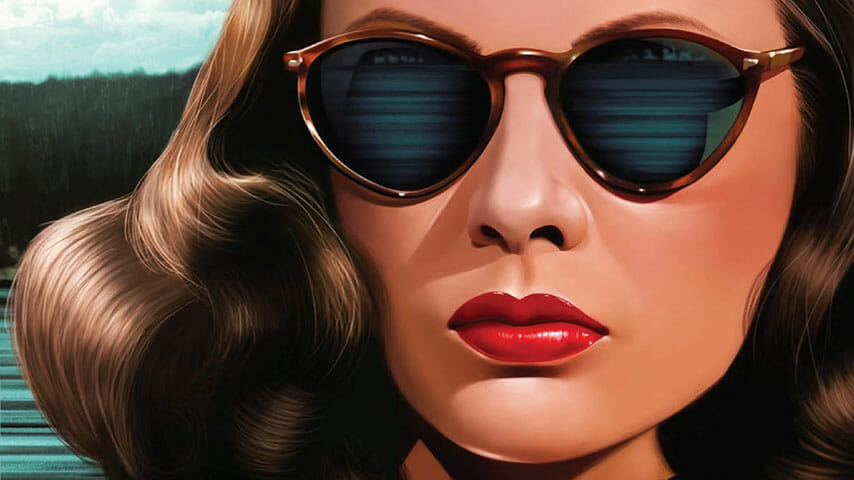
Each month, Paste brings you a look at the best new selections from the Criterion Collection. Much beloved by casual fans and cinephiles alike, Criterion has for over three decades presented special editions of important classic and contemporary films. You can explore the complete collection here.
In the meantime, because chances are you may be looking for something, anything, to discover, find all of our Criterion picks here, check out some of our favorite new releases from March, and, hey, since many of us have a lot more time on our hands, maybe sign up for Criterion’s Criterion Channel to stream many of the titles we talk about here.
Salesman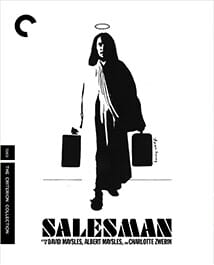 Year: 1969
Year: 1969
Directors: Albert Maysles, David Maysles, Charlotte Zwerin
Genre: Documentary
Rating: NR
Runtime: 91 minutes
The Maysles’ ode to the can-do attitude of the so-called “Greatest Generation” is an ever-saddening study in charisma: who has it, what it is and just how deeply, unintentionally ingrained it is in our whole model of the American Dream. In following four Bible salesmen, each with an animalistic nickname to handily keep them apart, we’re able to observe the pitch process from seemingly every persuasive angle. Some salesmen are wise and respectful, others enthusiastic and joking, and still others resort to bullying nervous stay-at-home moms or emasculated husbands into signing a pay stub. Couple that ethical conundrum with the product they’re hocking—the original “Good Book,” apparently—and it’s no surprise when one of the salesmen (Badger, who hits a streak of shitty luck, never living up to his name) loses all hope in his vocation and spends every night in his shared hotel room complaining to his fellow salesmen that what they’re doing is existentially bound to fail. And yet, Rabbit has no trouble keeping his sales up, and the Bull always walks out with scribbled-on chits. Badger just happens to be a dying breed of salesman, a guy whose charisma refuses to adapt. What’s worse: He’s got no one to blame but himself. And capitalism. —Dom Sinacola
Bamboozled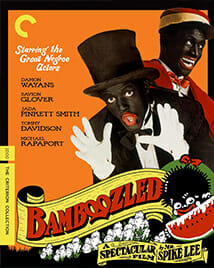 Year: 2000
Year: 2000
Director: Spike Lee
Stars: Damon Wayans, Savion Glover, Jada Pinkett Smith, Tommy Davidson, Michael Rapaport
Genre: Comedy, Drama
Rating: R
Runtime: 136 minutes
Shot on MiniDV, Bamboozled is a blue-and-orange, grain-infused product of turn-of-the-Millennium consumer culture, today looking simultaneously dated and a sign of what must have been the cutting edge at the time. So it goes with the television network employing Black executive Pierre Delacroix (Damon Wayans, lifting a ludicrously affected “white” accent to transcendent heights) who, in order to get fired Producers-style and go on to make the TV shows he really wants to make, pitches a minstrel show 2.0 to his “streetwise” white boss, Thomas Dunwitty (Michael Rappaport, who’s maybe probably just playing himself). Dunwitty’s psyched on the project, assuming that its offensiveness—putting Black people in Black face on prime time TV—will be exactly the kind of subversive energy the network needs, not, as Delacroix’s assistant Sloan (Jada Pinkett-Smith) can’t quite get around to accepting, the retrograde disaster Delacroix first intended it to be. Their program, Mantan: The New Millennium Minstrel Show, is of course a major hit, encouraging America to once again admit they’re fine with the n-word. Steeped in meta-textual commentary—casting both Wayans and Tommy Davidson of In Living Color, which one gets the impression Lee would call a modern-day minstrel show; staging long acts of the actual show, forcing the audience to sit with Mantan long past it serving any plot-based purpose—Bamboozled teems with vitality, with ideas, with a generous spirit of anger and love and pain. —Dom Sinacola
Leave Her to Heaven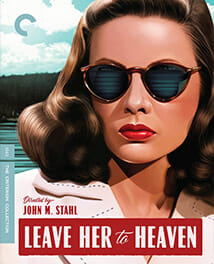 Year: 1945
Year: 1945
Director: John M. Stahl
Stars: Gene Tierney, Cornel Wilde, Jeanne Crain, Vincent Price, Darryl Hickman
Genre: Drama, Thriller
Rating: NR
Runtime: 110 minutes
Gene Tierney’s Ellen Berent is a woman driven to commit nigh-unspeakable acts by her possessive jealousy of her husband, Richard Harland (Cornel Wilde). If only Alfred Hitchcock had made Strangers on a Train before poor Richard fell in love with Ellen; a parable about the dangers of making nice with random people on locomotives would’ve saved him trouble, heartache, and a couple years of jail time. It goes without saying that Tierney is Leave Her to Heaven’s main attraction: Still and frosty as an iced lake, she dominates the film with her eyes and a set jawline, dooming all caught in her orbit to the whims of her ruinous desire—her desire being to have Richard to herself, at the expense of his beloved, good-natured paraplegic brother, Danny (Darryl Hickman), her sunny adoptive sister, Ruth (Jeanne Crain), and even the unborn son she aborts with a staged trip down a flight of stairs in one of the narrative’s most jaw-dropping developments. Ellen is envious, narcissistic evil incarnate, and John M. Stahl makes the most of the work Tierney does accentuating her primal allure mostly by letting her act through expression. She’s coolly terrifying. Leave Her to Heaven grows gelid by consequence despite the rich Technicolor aesthetic. It’s a movie rife with craft but void of warmth. —Andy Crump
The Cranes Are Flying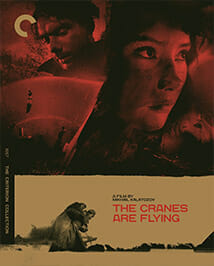 Year: 1957
Year: 1957
Director: Mikhail Kalatozov
Stars: Tatiana Samoilova, Alexei Batalov, Vasily Merkuryev, Alexander Shvorin, Svetlana Kharitonova, Antonina Bogdanova, Valentin Zubkov
Genre: Drama, War
Runtime: 96 minutes
It seems almost unfathomable that Mikhail Kalatozov’s films could exist in a time before CGI and the Steadicam. The wonder of his visuals and effortless control over crowd scenes is most evident in his titanic piece of propaganda, I Am Cuba, but his Palme D’Or-winning The Cranes Are Flying is the holistically superior film. Romance between Veronica (Tatiana Samoilova) and Boris (Aleksey Batalov) is put on hold when Russia enters the war and Boris volunteers to fight, beginning simultaneous tales of life on the front and at home in the former Soviet Union. Whereas I Am Cuba feels like Marxist didacticism as well as an exercise for the director and frequent partner, cinematographer Sergei Urusevsky, to display the full splendor of their technique, the incredible tracking shots and opulent framing here serve only the story. Covering four years of struggle in a concise 97 minutes, The Cranes Are Flying makes more famed epic war romances like Dr Zhivago and Reds look positively indulgent—more so, anyway. —Brogan Morris
Show Boat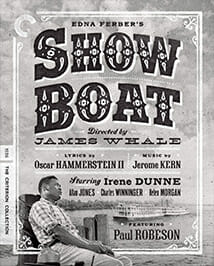 Year: 1936
Year: 1936
Director: James Whale
Stars: Irene Dunne, Allan Jones, Paul Robeson, Hattie McDaniel, Charles Winninger
Genre: Musical, Drama
Rating: NR
Runtime: 113 minutes
James Whale’s name is best known in relation to horror: Frankenstein, The Old Dark House, Bride of Frankenstein, The Invisible Man. There’s no horror in Show Boat, his 1936 adaptation of Jerome Kern and Oscar Hammerstein’s musical, itself an adaptation of the classic Edna Ferber novel, but there is plenty of design and atmosphere, these being keys to his work in the scariest of all genres. The sets and costumes are rich with detail, intricate and thoughtful, each element of mise-en-scène given purpose. Romantic comedy is the film’s oxygen but the production value is its topsoil. And though Irene Dunne and Allan Jones are its stars, the heart of Show Boat rests in Whale’s supporting cast: Paul Robeson, Hattie McDaniel and Charles Winninger, supplying the movie’s best comedy and strongest sense of humanity. If you haven’t heard Robeson sing, you may as well start with his rendition of “Ol’ Man River,” quite handily the best-orchestrated sequence here, from filming to blocking to editing. Hammerstein’s lyrics are given a bit of polish to scrub out the inherent racism, for one thing, though audiences watching the picture in 2020 may see it as quaint at best and a reflection of racism’s American roots at worst. Show Boat is very much a product of its time, but the steps that Whale takes to course-correct, even if he misses a few cringe-worthy scenes (like Dunne donning blackface), are also a product of the film’s time, and as film history goes, Show Boat’s place in its evolution cannot be ignored. —Andy Crump